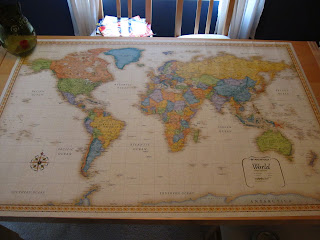Get Connected (Step 5 of 6)
As humans, we are not meant to be alone. We are born to connect. Even as babies, we cried when we needed touch, or as Dr. Ilardi tells in the book, "...babies instinctively know it's (being alone) a recipe for biological disaster" (163). If we are left alone for a few days, not only do we feel lonely, but all sorts of negative effects start happening. "Our stress hormones escalate, mood and energy plummet, and key biological processes quickly fall out of balance" (163/64). Hundreds of years ago, people ate together, played together, talked together, and lived together. Today we are living more disconnected than we ever did in our past. We text, instead of talk, chat online with people we don't even know (which is better than not chatting to anyone at all), stay in doors, eat alone, live alone, sleep alone, and recreate alone. "Nearly 25% of Americans have no intimate social connections at all, and countless others spend the bulk of their time by themselves" (164). Sad, isn't it? I like knowing my neighbors, and being able to knock on the door to borrow a cup of sugar, but how many of us really KNOW our neighbors? I have lived in my Seattle condo for 10 years and only know the neighbors below me, but the other 8, not a clue. I wouldn't even recognize them if I saw them on the street. GAH!
As Dr. Ilardi discusses in the book, isolation is a major risk factor for depression. Since depressed people tend to withdraw from others, their social connections get deprived, heightening their depression even more. Why do depressed people withdraw? I only bring up this point because he quoted my exact feelings when I was at rock bottom in my depression. I remember telling my counselor, and a few friends that I just wanted to "crawl into a hole and wait for it all to go away". Dr. Ilardi said the same thing, but he wasn't talking about depression, he was talking about having the flu. With any illness, even the common cold, we naturally withdraw from others to get better. No one feels like socializing when they want to vomit or have a fever of 101, and depressed don't either. They are embarrassed of how they feel, they think they are being selfish for thinking of themselves, they have no energy to contribute to the conversation, they don't feel they are worth others time...the reasons can go on and on.
When I was in the summer of my deep sadness, I upset a lot of friends, but I didn't know how to fix that nor did I really want to at the time. The problem was, a lot of my friends had no idea what I was going through, they just assumed I stopped calling cause I didn't like them, or was a bad friend.
I remember having dinner with Hans-Eric. I didn't realize it at the time, but during dinner we hadn't said a word to each other. Now that I look back, I barely remember even being there, my mind was completely somewhere else. After we left the restaurant, he stopped us from walking, took my shoulders to face him and said "Where are you? I can't find you, or reach you. It's like you are lost in your own head." The look on his face killed me. I didn't know where my mind was, but I also didn't want to keep hurting him. I came to the conclusion that he was better off without me. He deserved a happy girl who talks with him. This is just one of the many examples of how I... excuse me, how my depression, hurt my relationships. So what do we do to help find the motivation to keep our relationships intact and to continue connecting with loved ones? The book kindly told me the following advice.
As Dr. Ilardi discusses in the book, isolation is a major risk factor for depression. Since depressed people tend to withdraw from others, their social connections get deprived, heightening their depression even more. Why do depressed people withdraw? I only bring up this point because he quoted my exact feelings when I was at rock bottom in my depression. I remember telling my counselor, and a few friends that I just wanted to "crawl into a hole and wait for it all to go away". Dr. Ilardi said the same thing, but he wasn't talking about depression, he was talking about having the flu. With any illness, even the common cold, we naturally withdraw from others to get better. No one feels like socializing when they want to vomit or have a fever of 101, and depressed don't either. They are embarrassed of how they feel, they think they are being selfish for thinking of themselves, they have no energy to contribute to the conversation, they don't feel they are worth others time...the reasons can go on and on.
When I was in the summer of my deep sadness, I upset a lot of friends, but I didn't know how to fix that nor did I really want to at the time. The problem was, a lot of my friends had no idea what I was going through, they just assumed I stopped calling cause I didn't like them, or was a bad friend.
For those friends who don't understand the seriousness of depression, the disorder's characteristics withdrawal can become a source of great pain and frustration. Simply put: It's hard to watch someone pulling away and shutting down, especially when you can't figure out why in the world it's happening. Even friends who know that social withdrawal is a core symptom of depression may find themselves feeling rejected" (169).
I remember having dinner with Hans-Eric. I didn't realize it at the time, but during dinner we hadn't said a word to each other. Now that I look back, I barely remember even being there, my mind was completely somewhere else. After we left the restaurant, he stopped us from walking, took my shoulders to face him and said "Where are you? I can't find you, or reach you. It's like you are lost in your own head." The look on his face killed me. I didn't know where my mind was, but I also didn't want to keep hurting him. I came to the conclusion that he was better off without me. He deserved a happy girl who talks with him. This is just one of the many examples of how I... excuse me, how my depression, hurt my relationships. So what do we do to help find the motivation to keep our relationships intact and to continue connecting with loved ones? The book kindly told me the following advice.
- Disclose. This sounds so easy, but it's not. So many people hide their depression by putting on a mask and going through the day with a fake smile and fake laugh. "No one wants to risk being viewed as "crazy" (or weak, or lazy, or any number of other qualities mistakenly attributed to those suffering from depression)" (170). But if your friends don't know what is going on with you, then they are left in the dark and only have room to guess. You would be surprised at how supportive people are. When I blogged about rumination the other day, I told everyone I made my list of friends to call when I needed to talk, and the next day I got a few texts saying "I'd better be on that list". I couldn't have done this without support. It's similar to having a broken leg, and trying to hide it from people and walk on your own. It's impossible.
- Educate. "Friends and family need to know three things: Depression is an illness-one that robs people of their ability to function; like many other forms of illness, depression typically leads its victims to withdraw from friends and loved ones; nevertheless, social support can play an important role in the recovery process" (170).
- Ask. ASK FOR HELP. Call up a friend and tell them your situation. "Hey friend, I haven't been feeling well the past few weeks, and I'm sorry I haven't called you back. I'm going through a depression and seeing you would really help. Do you think we could have lunch tomorrow? I also might have trouble taking the initiative on other outings, so if you don't hear from me, would you please check in on me?" Any friend who wouldn't do that for you is no friend at all.
- Avoid Negativity. Having negative conversations can trigger an episode of rumination. Try to stay clear of upsetting topics and instead plan outings that are around shared activities.
Let's also not forget friends at a distance. In my current situation, I do have friends here in Skagway but my super close friends and family all live in other places. When I was going through my summer of ugliness, I luckily had Rosie here at my side. I did, however, cut friends off that lived in other cities. For example, Barbie in Seattle. After my sad summer, she and I were talking about hanging out, and she made a comment that I never call her back. Of course I never called her back, I didn't want to bring her down too! Now that I'm out of my deep sadness, I use video chats (Skype), to keep in contact with loved ones. It's a great tool, especially if you are a seasonal worker away from friends and family.
There are other ways, besides friends and family, to get connected. "One of the surest paths to boosting mood is giving to someone else in need. Such giving can take many forms" (186). For example, building houses for Habitat for Humanity, helping in a soup kitchen, being a Big Brother or Big Sister, caring for a pet, babysitting, etc etc. www.volunteermatch.org is a helpful site. If you live in smaller towns, check the local paper, or call city hall.
Dr. Ilardi has an entire section on "Finding Community". Being from a small town in Ketchikan, I always felt apart of my community, but tragically, I have never felt that way about Skagway. However, I haven't done any of the things he suggested. Church, Volunteer organizations (as previously mentioned), social organizations (Eagles, Moose, Elks), self-help groups (Depression and Bipolar Support Alliance, DBSA), interest groups (book clubs, running club, etc), sports leagues, and/or work. For the most part, I'm too busy for any of the above, except church, but I have never found one here that I love. I think I'll stick with interest groups and volunteering where I can.
If you still are having trouble making connections, or just can't seem to take the first step, there is always internet friends. Dr. Ilardi recommends a few websites: depressionforums.org/forums/, healingwell.com, beatingthebeast.com
I only have one more step to discuss with you, sleep. I also just got my light box in the mail today. Do you know how excited I am!??!?! I have implemented 4 of the steps so far. Omegas, exercise, engaging activity and sleep. 4 points me (for each step I am doing currently), 0 points depression. Once I am finished discussing the last step, I will blog a little of what changes I have done in my life the last two weeks.
xo



Comments